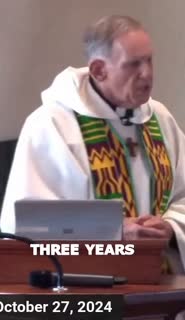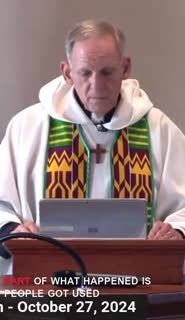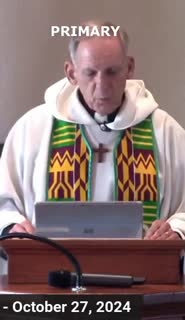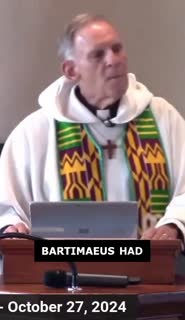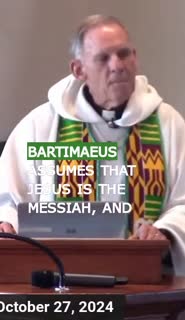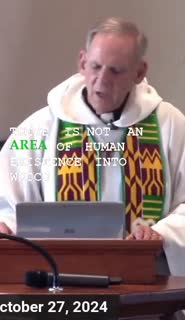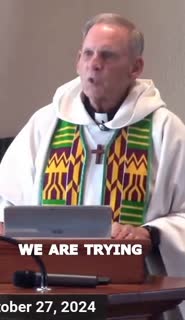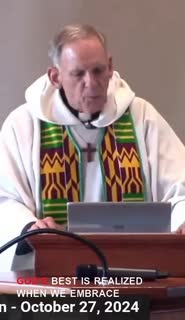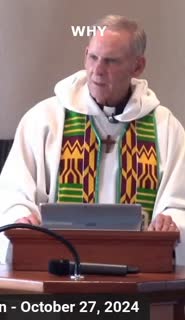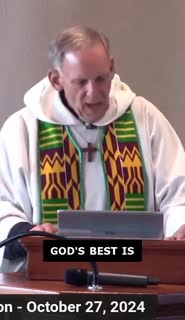Faith and Transformation: The Story of Bartimaeus
Devotional
Sermon Summary
Bible Study Guide
Sermon Clips
1. "Three years ago, the worldwide pandemic wreaked havoc in our lives. Physically, economically, socially, mentally, and especially spiritually. And some of us struggled during that pandemic in ways that complicated things immensely. I know Craig ended up diagnosed with leukemia. And Joe lost his wife. And I could go around the room and just share the other things that happened during the pandemic that most of us really didn't know about. It was a tough, tough time. And it was very demoralizing. It was easy to kind of lose hope. And even coming out of the pandemic, we thought, things are going to get back to normal now. Everything will be fine. But the riots that plagued our country and the division continued unabated. We faced inflation like we've never seen before." [33:48] (65 seconds)
2. "Part of what happened is people got used to staying home and watching church on TV, doing church in their pajamas and going to church. And so, they've not come back to church. And we still have a lot of people watching this morning online. I'm grateful that they're watching. I'm grateful. But it ain't church. It's not the same. Last night, my granddaughter turned 16, Emily. And they had a party. And on the TV, they had a fireplace on the TV going. And I thought, wow, that's really pretty. Church from home is not really church. You're watching a picture of church. You're watching from a distance." [35:36] (48 seconds)
3. "God's primary way to speak to us is through His Word. And it will always be that objective way that we come to know Him. Well, God spoke to me through this story that Bud read of blind Bartimaeus. He was a man who was treated roughly by life. Most of us can relate. Most of us, in fact, feel like we've been treated roughly by life. But Bartimaeus had been beaten down in a way that far more than anything I've experienced and certainly than any of us could have imagined." [36:59] (38 seconds)
4. "Bartimaeus had every reason to be discouraged and every excuse to just give up and kind of settle for a meager existence of begging. None of us could hold the candle to Bartimaeus when it comes to being beaten down by life. But I believe that, like Bartimaeus, most of us want to do more than just get by. We want God's best in our life. Our story actually provides us with biblical principles for living at the level of God's best. The life that God planned for you. The life that God wants for you." [37:58] (46 seconds)
5. "Bartimaeus assumes that Jesus is the Messiah, and as the Messiah, he's come to deliver. And Bartimaeus thought, well then, why not me? That's a great attitude. If he's gonna deliver anybody, it's gonna be me. I think that's the attitude it takes. Here's the thing that we have to know about Jesus as the Messiah. He came because he's aware of our needs. He knows our hearts. He knows what we're into. He knows what we're doing and what we shouldn't be doing." [40:01] (38 seconds)
6. "There is not an area of human existence into which Jesus has not already spoken. Whether it's emotional, financial, or physical, or spiritual, Jesus has provided promises of redemption and God's ultimate best when we meet his conditions of faith. So we've got to recognize who he is. He is the Messiah, the one promise. And we have to recognize that as the Messiah, as God, he is able and willing to meet us at that place of our felt need." [41:47] (41 seconds)
7. "We are trying to pry his hand open to grab the pennies and what God wants is not that we look to his hand, but that we look him in the eye. God loves you. And he uses the felt need, that need for pennies as a way to get you out of the way. As a way to get you in his lap. As a way to draw you close. And so as believers we have to stop looking at the pennies and look him in the eye. And know that that deepest need for all of us is that need to be loved unconditionally. To be cared for." [43:58] (40 seconds)
8. "God's best is realized when we embrace the change, and when we accept it. When we ask boldly. Bartimaeus is ushered before Jesus. Imagine this. He's blind. He stinks. He's filthy. And Jesus simply asks him, what would you have me do? Now, I would have been tempted to say, duh, I'm blind. I mean, what do you think I want? I'll take a 20, you know. Seriously, Jesus, ask Bartimaeus, what would you have me to do? Because it's not a dumb question at all, or rhetorical. Bartimaeus had in front of him, at this moment, a blank check. God himself has said to him, you got my attention. What do you want? What would you have me to do?" [54:20] (61 seconds)
9. "Why don't we ask small things from God? Why not ask great things of God and expect great things from God? Why don't we live that way? Why don't we boldly ask for what really would be transformational in our lives? The author of Hebrews tells us that we are to come boldly to the throne of grace to find grace to help in our time of need. Come boldly. And when the author of Hebrews writes that, it's right after he talks about the veil and the temple being rent in two. And that veil represented Jesus' very flesh being torn in two for our sins. For our salvation. For our forgiveness. And for our healing." [58:23] (62 seconds)
10. "God's best is obtained when we recognize Jesus as a true source of our needs. When we recognize Jesus as a true source of our problems. When we persistently refuse to be settled for less and when we boldly ask for God's very best. That's the way you become the hero of your story." [59:38] (24 seconds)
Ask a question about this sermon
2. "Part of what happened is people got used to staying home and watching church on TV, doing church in their pajamas and going to church. And so, they've not come back to church. And we still have a lot of people watching this morning online. I'm grateful that they're watching. I'm grateful. But it ain't church. It's not the same. Last night, my granddaughter turned 16, Emily. And they had a party. And on the TV, they had a fireplace on the TV going. And I thought, wow, that's really pretty. Church from home is not really church. You're watching a picture of church. You're watching from a distance." [35:36] (48 seconds)
3. "God's primary way to speak to us is through His Word. And it will always be that objective way that we come to know Him. Well, God spoke to me through this story that Bud read of blind Bartimaeus. He was a man who was treated roughly by life. Most of us can relate. Most of us, in fact, feel like we've been treated roughly by life. But Bartimaeus had been beaten down in a way that far more than anything I've experienced and certainly than any of us could have imagined." [36:59] (38 seconds)
4. "Bartimaeus had every reason to be discouraged and every excuse to just give up and kind of settle for a meager existence of begging. None of us could hold the candle to Bartimaeus when it comes to being beaten down by life. But I believe that, like Bartimaeus, most of us want to do more than just get by. We want God's best in our life. Our story actually provides us with biblical principles for living at the level of God's best. The life that God planned for you. The life that God wants for you." [37:58] (46 seconds)
5. "Bartimaeus assumes that Jesus is the Messiah, and as the Messiah, he's come to deliver. And Bartimaeus thought, well then, why not me? That's a great attitude. If he's gonna deliver anybody, it's gonna be me. I think that's the attitude it takes. Here's the thing that we have to know about Jesus as the Messiah. He came because he's aware of our needs. He knows our hearts. He knows what we're into. He knows what we're doing and what we shouldn't be doing." [40:01] (38 seconds)
6. "There is not an area of human existence into which Jesus has not already spoken. Whether it's emotional, financial, or physical, or spiritual, Jesus has provided promises of redemption and God's ultimate best when we meet his conditions of faith. So we've got to recognize who he is. He is the Messiah, the one promise. And we have to recognize that as the Messiah, as God, he is able and willing to meet us at that place of our felt need." [41:47] (41 seconds)
7. "We are trying to pry his hand open to grab the pennies and what God wants is not that we look to his hand, but that we look him in the eye. God loves you. And he uses the felt need, that need for pennies as a way to get you out of the way. As a way to get you in his lap. As a way to draw you close. And so as believers we have to stop looking at the pennies and look him in the eye. And know that that deepest need for all of us is that need to be loved unconditionally. To be cared for." [43:58] (40 seconds)
8. "God's best is realized when we embrace the change, and when we accept it. When we ask boldly. Bartimaeus is ushered before Jesus. Imagine this. He's blind. He stinks. He's filthy. And Jesus simply asks him, what would you have me do? Now, I would have been tempted to say, duh, I'm blind. I mean, what do you think I want? I'll take a 20, you know. Seriously, Jesus, ask Bartimaeus, what would you have me to do? Because it's not a dumb question at all, or rhetorical. Bartimaeus had in front of him, at this moment, a blank check. God himself has said to him, you got my attention. What do you want? What would you have me to do?" [54:20] (61 seconds)
9. "Why don't we ask small things from God? Why not ask great things of God and expect great things from God? Why don't we live that way? Why don't we boldly ask for what really would be transformational in our lives? The author of Hebrews tells us that we are to come boldly to the throne of grace to find grace to help in our time of need. Come boldly. And when the author of Hebrews writes that, it's right after he talks about the veil and the temple being rent in two. And that veil represented Jesus' very flesh being torn in two for our sins. For our salvation. For our forgiveness. And for our healing." [58:23] (62 seconds)
10. "God's best is obtained when we recognize Jesus as a true source of our needs. When we recognize Jesus as a true source of our problems. When we persistently refuse to be settled for less and when we boldly ask for God's very best. That's the way you become the hero of your story." [59:38] (24 seconds)
